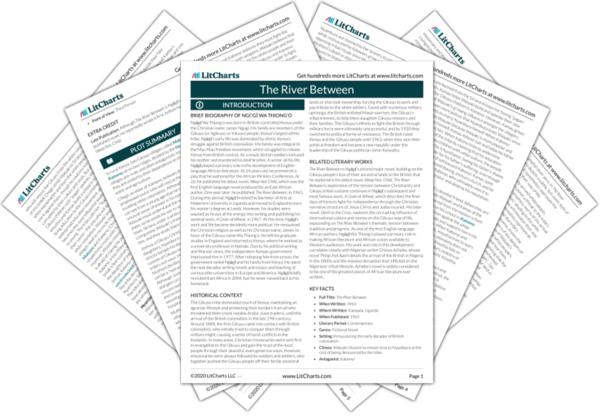In the novel, circumcision represents one’s adherence to Gikuyu traditions and cultural identity. Every Gikuyu man and woman is circumcised, a rite of passage that ushers them into adulthood and affirms them as a true member of the tribe. Waiyaki recognizes circumcision as their tribe’s most important rite; beyond being a personal source of meaning and identity, circumcision also provides the tribe’s “social cohesion” and connects the tribespeople to each other and to their ancestors throughout history. In other words, one cannot be truly Gikuyu without being circumcised. Muthoni speaks to this when she explains that she wants to be circumcised so that she can be “a real woman, knowing all the ways of the hills and ridges.” To Muthoni, circumcision is a marker of adulthood, but it imbues her with a certain knowledge of the Gikuyu way of life.
However, circumcision also represents the difficulty some characters have in embracing both the white missionaries’ Christianity and their own Gikuyu traditions. Joshua, the Gikuyu Christian pastor, and Livingstone, a white missionary, both forbid their followers from practicing circumcision, which they see as a sinful “pagan” ritual. But in outlawing circumcision, these men symbolically spurn the Gikuyu people’s own cultural identity. Although Joshua’s youngest daughter, Muthoni, is devoted to the Christian faith, she feels that she cannot be a real woman unless she is circumcised like the Gikuyu woman of old. Her simultaneous desire to be circumcised and desire to maintain her Christian faith symbolizes her conflicted identity. Ultimately, Muthoni defies Joshua and leaves their family to participate in the tradition—even though her father disowns her for it—which speaks to how important a sense of personal and shared cultural identity is for the Gikuyu people. Indeed, after completing the procedure, Muthoni feels like a “true woman of the tribe.” Tragically, though, Muthoni’s surgical site becomes infected and she grows sicker and sicker. Before she dies, Muthoni sees a vision of Jesus and announces that she feels like a true Gikuyu woman, signifying that she managed to successfully embrace both her Christian faith and tribal identity. However, her death signifies that such resolution may come at a severe cost, especially when one is caught between such fierce ideological opposition.
On the other hand, when Waiyaki wants to marry Nyambura, a Christian, the tribe forbids it because she is uncircumcised and thus not committed to their tribal identity. Moreover, when the Kiama is considering violence against Joshua’s followers, they decide they will circumcise the Christians “by force,” signifying that they will demand allegiance to the tribe through violence.
It is important to note that female circumcision, which is prominent in the story, is now commonly called “female genital mutilation” and regarded as a human rights abuse. However, the story only uses it as an important cultural custom that women voluntarily undergo. Within the narrative, female circumcision is only significant as a symbol, not as an ethical dilemma.
Circumcision Quotes in The River Between
“Father and Mother are circumcised. Are they not Christians? Circumcision did not prevent them from being Christians. I too have embraced the white man’s faith. However, I know it is beautiful, oh so beautiful to be initiated into womanhood. You learn the ways of the tribe. Yes, the white man’s God does not quite satisfy me. I want, I need something more.”
Joshua was such a staunch man of God and such a firm believer in the Old Testament, that he would never refrain from punishing a sin, even if this meant beating his wife. He did not mind as long as he was executing God’s justice.
[Miriamu’s] faith and belief in God were coupled with her fear of Joshua. But that was religion and it was the way things were ordered. However, one could tell by her eyes that this was a religion learned and accepted; inside, the true Gikuyu woman was sleeping.
The knife produced a thin sharp pain as it cut through the flesh. The surgeon had done his work. Blood trickled freely on to the ground, sinking into the soil. Henceforth a religious bond linked Waiyaki to the earth, as if his blood was an offering.
Circumcision had to be rooted out if there was to be any hope of salvation for these people.
Circumcision was an important ritual to the tribe. It kept people together, bound the tribe. It was at the core of the social structure, and a something that gave meaning to a man’s life. End the custom and the spiritual basis of the tribe’s cohesion and integration would be no more.
Nyambura was not circumcised. But this was not a crime. Something passed between them as two human beings, untainted with religion, social conventions, or any tradition.
As the spiritual head of the hills, [Joshua] enforced the Church’s morality with new energy. All the tribe’s customs were bad. That was final. There could never be a compromise.
“You must not [marry Nyambura]. Fear the voice of the Kiama. It is the voice of the people. When the breath of that people turns against you, it is the greatest curse you can ever get.”












